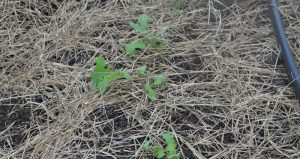By Les Harrison
Gardeners In North Florida
September is a month of curious contradictions and juxtapositions, at least for gardeners in north Florida. Depending on the individual characteristics of the environmental factors of the year, events and occurrences can cancel each other.
Still much can be accomplished during this transition period from summer to autumn. As with most gardening and horticultural activities, the rewards are several months in the future.
The summer of 2018 has delivered an ample bounty of rain, as the mosquitoes and weeds will testify. Historically, however September has been a dry month and the surplus may literally dry up.
Currently there is a horde of hurricanes and tropical waves swarming angrily in the heated waters of the Atlantic and Gulf of Mexico, and these may continue the outpouring, literally, of liquid resources. Either way the home gardener or landscaper can benefit.
Home Landscape, Now Is The Time to Add
Now is the time to add annuals and bedding plants to the home landscape to complement the color of the season. These may be started with seed in some cases, but there are many species and cultivars readily available in retail establishments and nurseries.

Ageratum, celosia, zinnia, and wax begonia are all good candidates, along with numerous others. The key to success to establishing these plants is to meet their needs for sun, water, and soil.
Sun exposure is related to where these plants are located in relation to objects which may shade the ever changes position of this natural light source. Commonly only the east to west movement of the sun is considered, but there is another factor to remember.
This time of year, the sun is progressively moving a bit further south in the sky each day. Depending on the surrounding structures, the exposure to light can change drastically over the next few months if a nearby object’s position changes relative to the sun.
Media Becomes Increasingly Important
The lack of water can be overcome with irrigation, if recent weather patterns continue. Given the sandy soils or near soil-less sands, the growing media becomes increasingly important.
High levels of organic matter in growing zones helps with the retention of critical moisture. Mushroom compost, homemade compost, peat moss and many other growing media will help keep the appropriate level of dampness during drier times.
Fall And Winter Vegetable Garden
September in Wakulla County is a great time to get the fall and winter vegetable garden off to a good start. As with annuals and bedding plants, the sun exposure, soil and water are all considerations.
Whether strawberry sets or collard seeds these and almost all others will need full exposure to the sun. If obstructions to the light are potential problem, evaluate them before planting so mediocre performance is avoided later.
Much like bedding plants and annuals, vegetable will yield better with a soil amended with organic material.
Broccoli, radishes, cabbage, kale and many others can be planted now for harvest in the mild days of Wakulla County’s late autumn. Some, like radishes, can have multiple crops over the course of the cool seasons.
The Aggressive Fall Armyworm

One caution with early autumn gardening is an aggressive and prolific pest, the fall armyworm. This caterpillar’s population is reaching its seasonal peak and tender young plants are the entree of choice.
It is eating like there is not tomorrow, which for this warm season nuisance is a consideration. The cooler weather eliminates many of its cousins, but unfortunately some will survive until next spring.
To learn more about autumn gardening options, contact the local UF/IFAS County Extension Office. Click here for contact information.
 0
0

